Dibber International School is authorized by the Swedish school inspectorate to deliver the Swedish national curriculum (Lgr11) while also aligning with the IB’s framework for teaching and learning. In this way, DIS offers an international education to students and families who wish to have the best of internationally recognized quality of and IB while also integrating into the Swedish educational system. Students are prepared to be global citizens and at the same time developing a strong foundation in the Swedish educational system to allow them to study further in Sweden or abroad. Students learn Swedish and English alongside one another in school and interact with local as well as global issues in their lessons.
Currently all three DIS schools in Sweden are in the candidate phase of becoming an IB world schools. The journey to becoming an IB world school takes approximately two years and is a collaborative process together with the IB to ensure the IB general rules and regulations are met. All the while, DIS schools also meet local and national requirements for instructional hours, subjects and core content, standardized testing and grading in accordance with the Swedish Ministry for Education (Skolverket).
PYP: Primary Years Program
The Primary Years Programme (PYP) is designed for students between the ages of three and twelve years old. It is an international, transdisciplinary programme designed to foster the development of the whole child, not just in the classroom but also through other means of learning. The PYP focuses on the total growth of the developing child, touching hearts as well as minds and encompassing social, physical, emotional, and cultural needs in addition to academic welfare. The PYP combines the best research and practice from a range of national systems with a wealth of knowledge and experience from international schools to create a relevant and engaging educational framework for all children. The philosophy of the PYP, as it directly affects the child, is expressed in a series of desired attributes and traits that characterize students with an international perspective. The aim of all IB programmes is to develop internationally minded people who, recognizing their common humanity and shared guardianship of the planet, help to create a better and more peaceful world.
The PYP curriculum framework emphasizes the central principle of agency that is threaded throughout the three pillars of the curriculum: the learner, learning and teaching and the learning community. Augmenting the focus of the “written, taught, and assessed” curriculum with the human elements-—the learner and the learning community—underlines that everyone connected to the school community has voice, choice and ownership to impact learning and teaching. These holistic components complement and reinforce each other to form a coherent whole. PYP learning is based on authentic inquiry-based learning and teaching that is engaging, significant, challenging and relevant. The PYP introduces us to educational principles and practices that will position learners as agents of their own learning at the center.
What makes the PYP unique?
Transdisciplinary teaching & learning
Transdisciplinary learning is at the heart of the PYP pedagogical model. Students learn through a lens of transdisciplinary themes that have global significance for all students in all cultures in all places. The themes address contemporary challenges surrounding environment, development, peace and conflicts, rights and responsibilities, and governance and foster deep learning in so far that they are revisited throughout the students’ primary years so that the end result is immersion in broad-ranging, in-depth, articulated curriculum content. The themes contribute to the common ground that unifies the curriculum in all IB World Schools offering the PYP. The model is supported by the core content from the national curriculum (Lgr11) combined with conceptual understandings (big ideas) and skills from the traditional subject areas.
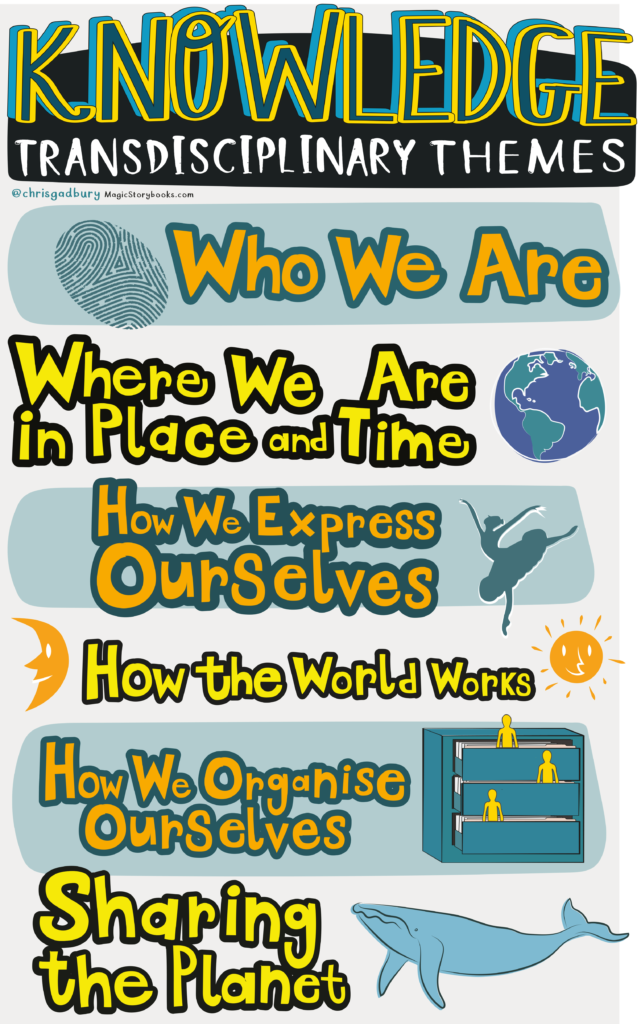
Agency- voice, choice, and ownership
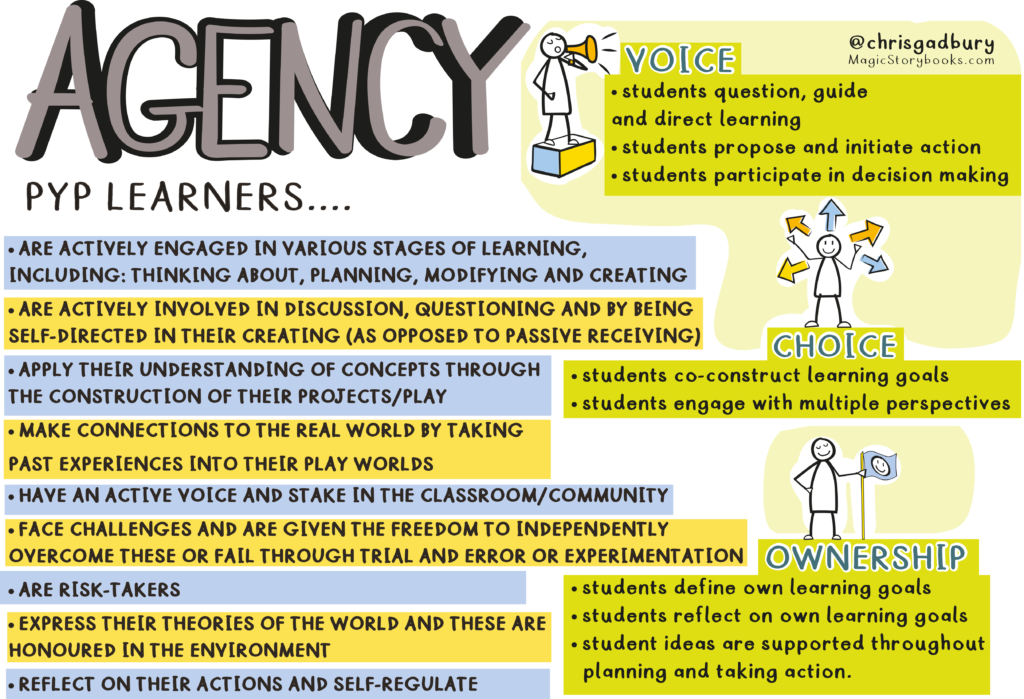
In a PYP classroom students have voice, choice and ownership for their own learning. Students are involved in the learning journey from the beginning, identifying what they already know on a topic to support the teacher in finding the next steps in their learning journey. Students also ask questions and help drive the inquiry in the classroom. They are also included in reflecting on and designing what a successful end product might look like through co-building rubrics together with their teacher and writing success descriptors for a piece of writing or task. When students’ have agency, the relationship between the teacher and students becomes a partnership. Students with a strong sense of self-efficacy bring a stronger sense of agency to the learning community. The learning community supports agency and fosters self-efficacy.
By involving students throughout the learning journey students are engaged and take ownership of their own learning and see their own role and they impact they have on the world around them.
Conceptual understanding and “big ideas” at the core of learning (key concept visual)
Concepts are big ideas that have relevance within specific disciplines and across subject areas. IB students use concepts as a vehicle to inquire into issues and ideas of personal, local and global significance and examine knowledge holistically. The PYP prescribes seven key concepts that transcends disciplinary learning and help students see the “big ideas” in the disciplinary learning. Along with the key concepts there are related concepts that give the learning a more disciplinary focus. Concepts help students and teachers explore the essence of a subject and deepens the disciplinary (facts and knowledge) that students are interacting. By looking at knowledge with a conceptual lens, students are able to connect to their disciplinary knowledge, but also to other related topics.
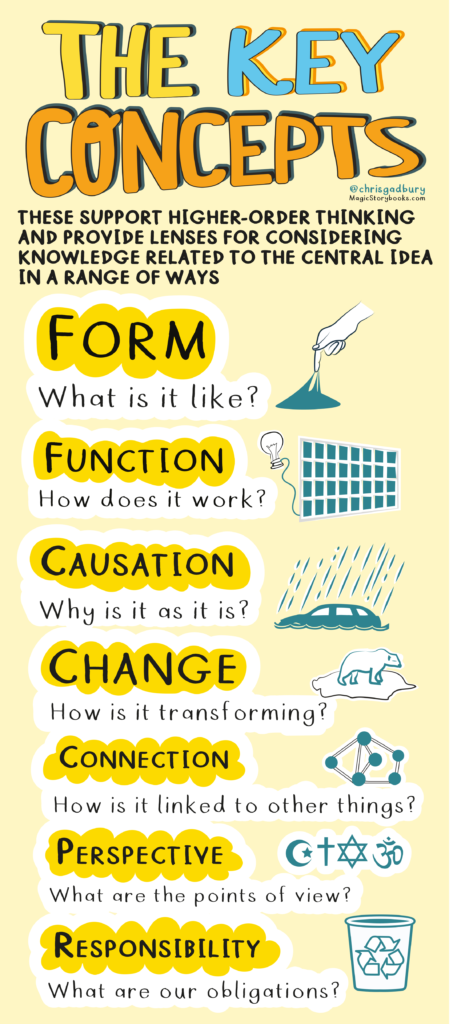
IB Learner Profile
developing life-long learners who work to take action for positive change
Within the IB there are four academic programmes: PYP, MYP, DP and CP. At the center of each of these programs is the learner and the learner profile. Why did the IB and the program development team determined that an IB education should strive to develop a broad range of human capacities and responsibilities that encompass not only intellectual, but also personal, emotional, and social growth. In that way, students who go through an IB education develop a multifaced toolbox of skills that they can carry with long after they exit an IB classroom for the last time. Below is an illustration that IB has created that identifies those attributes that and IB education strives to achieve.

The goal of classroom teaching and learning is to aspire to model and challenge students to be thinkers and knowledgeable about the world around them, but at the same time be open-minded and reflective about different perspectives and experiences that others bring to the classroom and the world. Through demonstrating a caring attitude and being principled students can apply their new knowledge and perspectives to help take action for positive change.
The second ring in the diagram points to entry points in working with the learner profile to reflect on the journey involved in promoting, practicing, and developing these attributes over time. There will also be some areas that come easier to a student or teacher than others, and through appreciating the importance and value of these attributes students and teachers together can reflect on the learner profile throughout their units of inquiry and how they facilitate and provide a lens for studying a given area.
Lastly, a goal of IB education is to instill international mindedness in the students, teachers and families who work and study inside of an IB school. Developing and demonstrating the learner profile provides an important foundation for striving towards international mindedness. Through reflection and open-mindedness we are able to see, as the IB mission states, “that other people, with their differences, can also be right”.
MYP: Middle Years Program
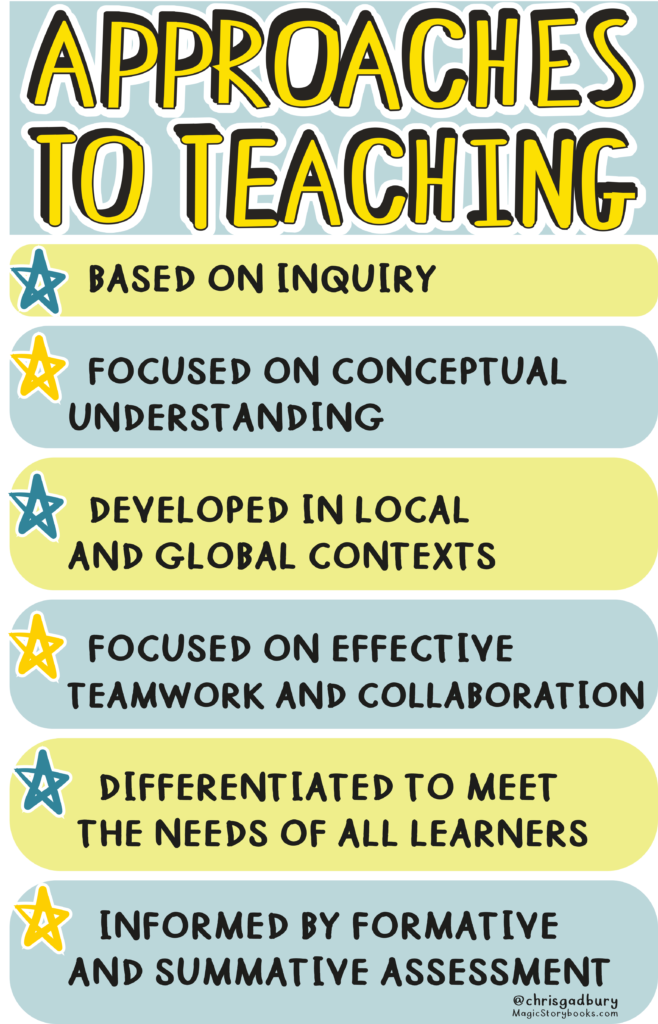
• Key and related concepts are big ideas, which form the basis of teaching and learning in the MYP. They ensure breadth and depth in the curriculum and promote learning within and across traditional disciplines.
• Global contexts provide shared starting points for inquiry into what it means to be internationally minded, framing a curriculum that promotes multilingualism, intercultural understanding, and global engagement.
• Approaches to learning skills (referred to as ATLs) are skills which help students become more aware of and manage their own learning and as a result become actively involved in their learning journey. Approaches to provide a foundation for future learning and success in further education and the world beyond the classroom.
• Approaches to teaching skills are skills used by the MYP teachers to activate prior understanding, stimulate interest, and establish the why for the topics that are being discussed inside the classroom.
· Service and action set out clear learning outcomes that grow from students’ participation in local and global communities.
Written-Taught-Assessed Curriculum
In the MYP there is a marriage between the written, taught and assessed curriculum that teachers and students are constantly aware of and reflecting on as the learning progresses. Students are engaged and involved in the establishing a framework for learning and for how and what we are assessing. Read more below about the written, taught and assessed curriculum.
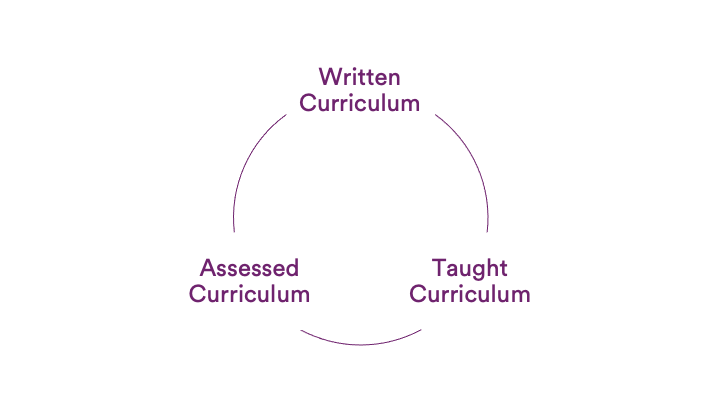
Written curriculum
Knowledge – What do we want the students to know?
Skills– How can they demonstrate that knowledge?
At DIS schools students study all subjects covered in the Swedish national curriculum (Lgr11). As an IB school, these subjects will be taught through units of inquiry. DIS teachers make sure that all students work deeply with the content and skills in the Lgr 11 curriculum, but this is done using the MYP’s framework for teaching and learning.
Students study units of inquiry in each subject of the MYP. Each unit runs approximately 6-8 weeks with a central idea, called a Statement of Inquiry, which guides the students in the learning journey. Each unit fits under one of the six global contexts that are chosen from the IB for their global significance and illustrating the commonalities of human existence. The global contexts are considered essential in the context of a program of international education.
The six transdisciplinary themes of the PYP follow the students up to the MYP and become the Global Context to frame the units of study in the MYP. Each unit of study has a Global Context to frame the learning and create a context to anchor learning. Below are listed the PYP transdisciplinary themes and how they feed into the MYP’s Global Contexts.
Taught curriculum: teaching and learning
The MYP emphasize the construction of meaning so that students’ learning will be purposeful and build on prior knowledge and students’ own curiosity. It is important to ascertain students’ prior knowledge, and to provide experiences through the curriculum that give students opportunities to test and revise their models, to make connections between their previous and current perceptions, and that give them the opportunity to construct their own meaning.
Each subject is taught through a unit of inquiry. All units are based upon a statement of inquiry that focus teaching and learning on one big idea that the teacher and the students explore together. Students will work actively with the statement of inquiry during the entire unit of inquiry.
The MYP encourages teachers to provide opportunities for students to build meaning and refine understanding through structured inquiry. As the learning process involves communication and collaboration, this inquiry may take many forms, with students working on their own or collaboratively with partners or larger groups, within the classroom or beyond.
Subject group overviews outlining the units of study are available for students and parents/guardians to review and follow along with the plan of study for each subject taught in the MYP.
Assessed curriculum
At the end of each unit of student students submit a summative assessment that connects directly back to the statement of inquiry to demonstrate their understanding of the knowledge and skills developed during the course of study. Learning through a unit of study helps the students stay focused on the ideas in focus and to deepen their understanding on the big ideas at the center of the learning.
MYP assessment gives teachers and students reliable and valid information on student learning. Integrated with the written and taught curriculum, the assessed curriculum is considered throughout the processes involved in planning for learning. Assessment in the MYP is largely an internal (school-based) process.
The MYP provides teachers with examples of the development of a range of authentic and targeted assessment strategies and tools that are focused on learning. Such strategies are communicated through subject-group guides, teacher support materials and workshop materials. These strategies and tools can be used to design assessment tasks that bring balance and integrity to the curriculum.
For further reading about how students are assessed in the MYP please see the DIS assessment policy.
Service and action in the MYP
Service is an essential part of all IB programmes. All students are encouraged and supported to participate in Service-Learning activities that are offered on campus, in class or for student to design their own meaningful response to their learning. All students in the MYP will engage with each of the seven Service-Learning outcomes by the end of the MYP 4 year (grade 9).
The focus is placed on being sensitive to other people’s needs and on carrying out meaningful actions to help other people and/or to make a difference to the community.
The Student Councils for the PYP and MYP organize service activities from time to time – for example, fundraising for emergencies around the world or global awareness projects.
Older students are encouraged to extend service and action into their own lives – for example, by developing their own volunteer projects or incorporating service into their PYP and MYP
Source: MYP From Principles to Practice (2014)